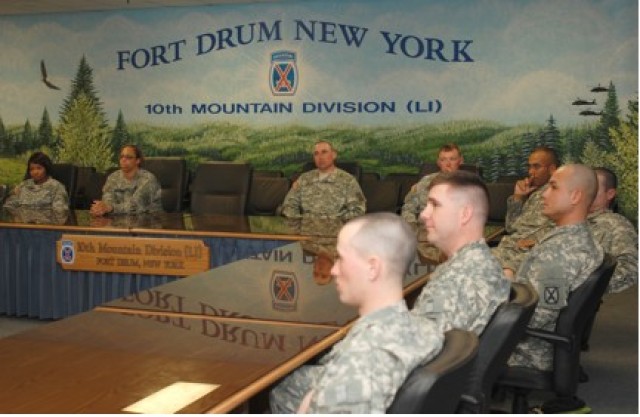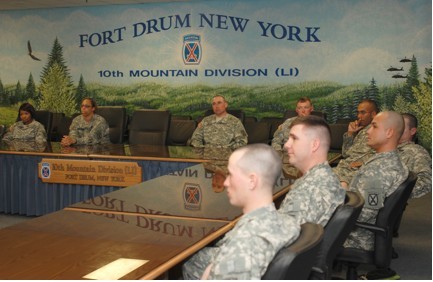Noncommissioned officers and junior-enlisted Soldiers from 10th Mountain Division (LI) gathered Friday at Hays Hall for a round-table meeting to discuss the "Year of the NCO" and the role NCOs play as leaders.
The hour-long conference covered various topics from Army values and training, to why each Soldier decided to join Army and what motivates them to stay in.
"My motivation is to lead Soldiers down the right path, like my leaders did for me," said Spec. Eurcyla Roberson, 277th Aviation Support Battalion, 10th Combat Aviation Brigade. "Because I have such good leaders, the NCOs I've observed, they've showed me exactly what I needed to do when it comes to my job. And, when they're not there, I know I can step up and take charge of the younger Soldiers."
All of the Soldiers attending the meeting agreed the Army's Noncommissioned Officer Corps deserves acknowledgment for its responsibility as leaders and trainers.
"I believe NCOs need to be recognized," said Pfc. Amy Twitchel, Headquarters and Headquarters Company, 1st Brigade Combat Team. "They work very hard. I watch them every day doing everything. They really should be acknowledged for what they do."
In addition, many in the group thought that an annual recognition, much like the ethnic heritage months we commemorate now, would be fitting to honor the Army's NCO Corps.
"The Army is a tradition-based organization," explained Sgt. 1st Class Aaron Rumbough, B Battery, 2nd Battalion, 15th Field Artillery Regiment. "The NCO is the 'backbone' of that organization. There are so many Soldiers in the Army (who) have absolutely no idea about the history and the prestige that goes with the Corps of the Noncommissioned Officers."
Rumbough added that a month dedicated for noncommissioned officers could have an observance or some other event that brings to light those NCOs, past and present, who have gone beyond expectations and brought favor to the corps.
"Something like that would be beneficial and make more Soldiers appreciate the leaders they have and make NCOs appreciate what they do as leaders," he said. "It would show how our Army is different from other armies with the amount of responsibility that is thrown on upon our noncommissioned officers."
During the discussion, several noncommissioned officers talked about how the NCO Corps has evolved since they enlisted.
"When we were a training Army and people joined the Army because they wanted a little bit of money and never thought we were going to war, learning was just muscle memory - it was repetitive," said Sgt. 1st Class Sean Jarvis, Headquarters and Headquarters Troop, 1st Squadron, 89th Cavalry Regiment. "But now, as a leader, it is that much more important to train properly, because now when we go out to the Super Bowl and we're in the game, you don't get that second chance. So whatever I do here is that much more important. That is my reward."
"I came in to go to college and realized this is what I love to do," Jarvis added. "I love being a teacher. I love the camaraderie and the esprit de corps. I love being a part of the military Family; I have so much pride in it. And, if I can give just a little bit of that to my Soldiers and the people I influence, it's contagious."
"I've always said the Army is a Family, and I want my Family to be the best," echoed Sgt. 1st Class Scott Madden, HHC, 2nd Brigade Special Troops Battalion. "As an NCO, I look at myself as a teacher. I want to teach my Soldiers how to be good Soldiers and how to be (good leaders). I want them to be a better leader than I am."
While many of the junior-enlisted Soldiers said they were undecided about whether they plan to continue with a career in the Army, all said their experiences have positive, in great part, because of the leaders they have had or seen.
Pfc. Michele Fry, who works in the training room at HHC, 1st BCT, said that since she joined the Army, she has learned a lot from her NCOs.
"An NCO is a professional," she said. "(An NCO is) somebody who is there to show you how your job should be done the correct way and teaches you when you make mistakes."
"Most of the NCOs I have dealt with have done that," she said. "They don't coddle you like a child."
"An NCO's job is set an example to younger Soldiers of how to work, how to live, how to be a better person overall," agreed Spec. Shanae Holly from HHC, 10th Combat Aviation Brigade. "They should always put their Soldiers first. They should always spend time with their Soldiers. They should encourage them in a positive way and always stay motivated and be someone Soldiers can talk to - a positive influence, because everyone needs that. Being an NCO is a big responsibility."
Toward the end of the meeting, each NCO offered a word of advice to new Soldiers in hopes of steering them down the right path to doing the right thing, whether or not they decide to make the Army a career.
"I would say the biggest thing is to keep your eyes and ears open," Rumbough said. "You're going to have good leaders, and you're going to have bad leaders, but you can learn from all leaders."


Social Sharing